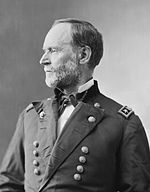Portal:Georgia (U.S. state)
|
Georgia /ˈdʒɔːrdʒə/ is a state located in the southeastern United States. It was established in 1732, the last of the original Thirteen Colonies. Named after King George II of Great Britain, Georgia was the fourth state to ratify the United States Constitution, on January 2, 1788. It declared its secession from the Union on January 21, 1861, and was one of the original seven Confederate states. It was the last state to be restored to the Union, on July 15, 1870. Georgia is the 24th most extensive and the 8th most populous of the 50 United States. From 2007 to 2008, 14 of Georgia's counties ranked among the nation's 100 fastest-growing, second only to Texas. Georgia is known as the Peach State and the Empire State of the South. Atlanta is the state's capital and its most populous city. Georgia is bordered on the south by Florida; on the east by the Atlantic Ocean and South Carolina; on the west by Alabama; and on the north by Tennessee and North Carolina. The northern part of the state is in the Blue Ridge Mountains, a mountain range in the vast Appalachian Mountains system. The central piedmont extends from the foothills to the fall line, where the rivers cascade down in elevation to the continental coastal plain of the southern part of the state. The highest point in Georgia is Brasstown Bald, 4,784 feet (1,458 m); the lowest point is the Atlantic Ocean. Georgia is the most extensive state east of the Mississippi River in terms of land area, although it is the fourth most extensive (after Michigan, Florida, and Wisconsin) in total area, a term which includes expanses of water which are part of state territory.
The 1898 Georgia hurricane was the most recent major hurricane to hit the U.S. state of Georgia, as well as the strongest on record in the state. It was first known to exist on September 29, although modern researchers estimated that it developed four days earlier to the east of the Lesser Antilles. The hurricane maintained a general northwest track throughout its duration, and it reached peak winds of 135 mph (215 km/h) on October 2. That day, it made landfall on Cumberland Island in Camden County, Georgia, causing record storm surge flooding. The hurricane caused heavy damage throughout the region, and killed at least 179 people. Impact was severest in Brunswick, where a 16 ft (4.9 m) storm surge was recorded. Overall damage was estimated at $1.5 million (1898 USD), most of which occurring in Georgia. In extreme northeastern Florida, strong winds nearly destroyed the city of Fernandina, while light crop damage was reported in southern South Carolina. After moving ashore, the hurricane quickly weakened and traversed much of North America; it continued northwestward until reaching the Ohio Valley and turning northeastward, and it was last observed on October 6 near Newfoundland.  Credit: Allen Lyons
Blood Mountain is the highest peak on the Georgia section of the Appalachian Trail and the sixth-tallest mountain in Georgia, with an elevation of 4,458 feet (1,359 m). It is located on the border of Lumpkin County with Union County and is within the boundaries of the Chattahoochee National Forest and the Blood Mountain Wilderness. There are several waterfalls, hiking trails and other recreational areas in the vicinity.
State symbols:
William Tecumseh Sherman was an American soldier, businessman, educator, and author. He served as a general in the United States Army during the American Civil War (1861–65), receiving both recognition for his outstanding command of military strategy, and criticism for the harshness of his "scorched earth" policies while conducting total war against the enemy. Military historian Basil Liddell Hart famously declared that Sherman was "the first modern general". In 1864, Sherman became the Union commander in the western theater of the war. He proceeded to lead his troops to the capture of Atlanta. His subsequent march through Georgia and the Carolinas further undermined the Confederacy's ability to continue fighting. He accepted the surrender of all the Confederate armies in the Carolinas, Georgia, and Florida in April 1865. After the Civil War, Sherman became Commanding General of the U.S. Army (1869–83). As such, he was responsible for the conduct of the Indian Wars in the western United States. In 1875, he published his Memoirs, one of the best-known firsthand accounts of the Civil War.
Select [►] to view subcategories
What are WikiProjects? Credit: Ebyabe
Fort King George was a fort located in the U.S. state of Georgia. The fort was built in 1721 along the Altamaha River and served as the southernmost outpost of the British Empire in the Americas until 1727. The fort was constructed in what was then considered part of the colony of South Carolina, but was territory later settled as Georgia. It was part of a defensive line intended to encourage settlement along the colony's southern frontier, from the Savannah River to the Altamaha River. Great Britain, France, and Spain were competing to control the American Southeast, especially the Savannah-Altamaha River region.
Featured articlesFeatured lists
Featured pictures
edit · history · watch · purge The following Wikimedia Foundation sister projects provide more on this subject:
Discover Wikipedia using portals |




























